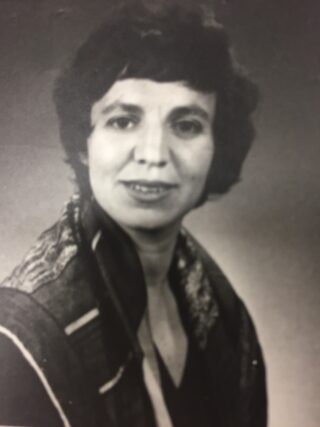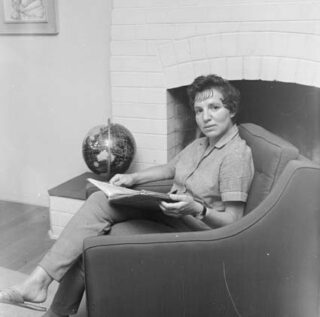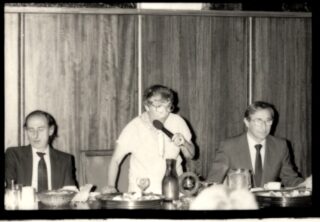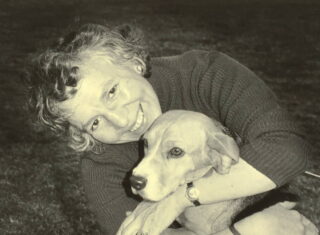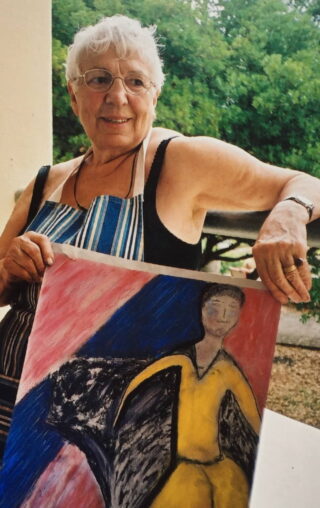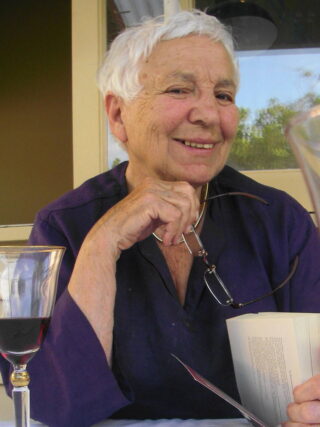- Entry type: Person
- Entry ID: AWE0006
Hunter, Thelma Anna Carmela
- Birth name Cibelli, Thelma
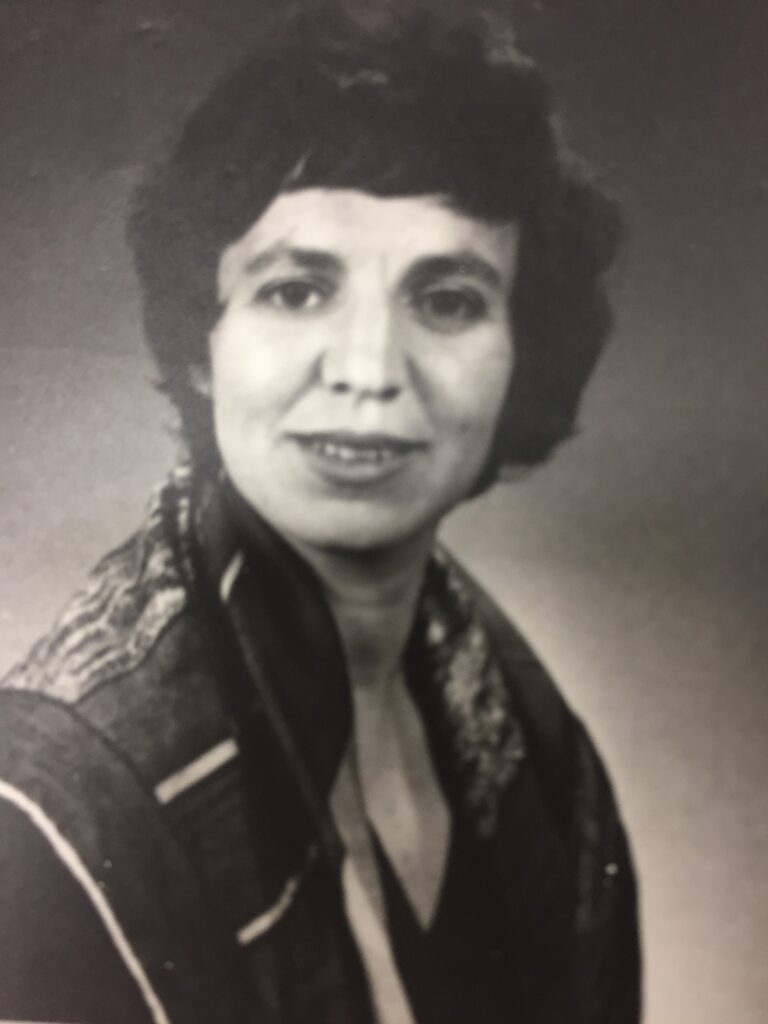
- Born 17 July 1923, Glasgow, , Scotland
- Died 9 January 2016, Canberra, Australian Capital Territory, Australia
- Occupation Academic, Political scientist, Women's liberationist
Summary
Dr Thelma Hunter was a feminist political scientist, whose academic career was mostly spent at the Australian National University (ANU). She described herself as a teacher, scholar and writer. As well as teaching university students, she worked in schools, in adult education and in preparatory courses for mature age non-matriculants seeking university entry. Before establishing her academic career, she contributed occasional articles to UK newspapers, and was later a regular contributor to the Canberra Times. A hobby artist, she offered drawing workshops to staff and students at ANU, having earlier studied art in evening classes in Sydney and at Dartington College, Devon.
For Thelma Hunter the personal was political; her academic interests in women’s employment, the status of women and the obstacles arising from combining work with marriage and family reflected her own experience. Growing up in an Italian family in Scotland, and later migrating with her family to Australia, Thelma Hunter also identified as a migrant.
Details
Thelma Cibelli was born at home in Glasgow, the fourth child of Italian migrants; her father Gaetano was the owner of a hairdressing shop. The only child not given an Italian first name, she was called after the actress Thelma Ritter, reflecting her mother Assunta’s enjoyment of popular films.
In her autobiography she wrote candidly of an unhappy childhood, growing up fearful of an authoritarian, unpredictable, violent father. She took refuge in ‘bookish achievements’.
Educated at the Convent of Mercy, she loved languages, finding French and Latin easy. In 1940 she began an Arts degree at Glasgow University, interrupting her studies when she ran away from home as a rebellious teenager. She lived with her hairdresser sister Lyda, initially working at the Coates thread factory as a stock clerk, and later undertaking secretarial studies. At this time she began keeping diaries (some still in the possession of her family). She joined the wartime Auxiliary Territorial Service in 1940 working as a driver, including driving large trucks despite being small statured (155 cm). During this time she wrote that she ‘joyfully’ discovered her sexuality. On demobilisation her service record was described as exemplary, despite an incident of being absent without leave when she stowed away to France to win a bet.
She met her Scottish husband Alex Hunter at a dance following their demobilisation. Resuming studies at Glasgow University, Thelma switched to political economy, a decision she attributed to her growing sense of social justice. Encouraged by Thelma, Alex followed her to university, studying economics. After living together for a period, during which time Thelma had a backyard abortion, they married at a Registry Office in 1947. Thelma gained a Master of Arts with First Class Honours in 1950 and in 1952 a Diploma in Secondary Education from Jordanhill College, Glasgow. In this time, she worked as a research assistant and began submitting articles published in the Glasgow Herald.
During five years living in Keele, following her husband’s appointment to the University of Keele in 1953, Thelma had three children, Stephen, Assunta (known during her school days as Susan) and Maxwell. Thelma taught adult education classes and worked as a relief school teacher, while continuing freelance journalism for the Manchester Guardian.
The family migrated to Australia in 1958 when Alex was appointed to the University of Melbourne, where Thelma later tutored in Economics. Thelma began research on women and employment, including interviewing the, by then old and frail, feminist labour activist Muriel Heagney. They moved to Sydney in 1961 when Alex took up a chair at the University of NSW and Thelma began tutoring in the Department of Government at the University of Sydney. During this time she participated with Madge Dawson in a series of television programs Doorway to Knowledge.
Alex Hunter had a major heart attack shortly after their arrival in Australia and, after other cardiac episodes, Thelma decided to seek fulltime work, facing the very real prospect that she would be supporting the family. Her 1963 application for a fulltime lectureship was unsuccessful – unlike Thelma, the successful male applicant not having a First Class Honours degree nor being a PhD candidate. Thelma was appointed to a lectureship in Political Science at the Australian National University (ANU) in 1965; Alex arriving two months later to take a Senior Research Fellowship in the Research School of Pacific Studies. Thelma’s PhD on the politics of national health was conferred in 1969.
Known for activities to make new staff and students feel welcome in the ANU community, Thelma was at various times tutor and member of the governing body of Garran Hall, a resident Fellow in Bruce Hall, a board member and the acting Steward of University House. While she was not against having a high table, she usually sat with students at dinners.
In 1971 Alex Hunter died suddenly while working in Papua New Guinea. Widowed at 47, Thelma experienced profound depression, a condition which had afflicted her since youth. In her autobiography she courageously examined her experiences of depressive illness, which she attributed to stress, exhaustion and the social isolation arising from employment with no family support. She was also acutely aware of the impacts of a childhood with a violent father; her sense of rootlessness living between worlds of Scottish and Italian identity, and frustration about the constraints imposed on her as a woman.
After her husband’s death, Thelma Hunter described her illness as profound. She retired from her Senior Lectureship in 1979 at the age of 56, after six months sick leave from the university; feeling her career potential was still unrealised. She continued her association with ANU as a Visiting Fellow. In 1981 she began a long period of periodic lecturing in Politics at the ANU Centre for Continuing Education.
In 1990 Thelma returned to ANU to write her autobiography, which is deeply candid – in contrast to her personal papers in the National Library of Australia, which reflect her academic interests in women’s issues, feminism, health policy and Indian politics.
In retirement Thelma enjoyed long country walks, which included traversing the high alpine Copland Pass in New Zealand and up and down the south rim of the Grand Canyon in the USA. She resumed art, which she had first studied in evening classes in Sydney; in 1978 gaining a Certificate of Special Studies in Art and Design from Dartington College, Devon, undertaken during long service leave from ANU. Thelma Hunter was a regular book reviewer for the Canberra Times and taught in a university bridging course for mature age entry students and occasional French lessons at Hawker Primary School in Canberra, where the students included two of her six grandchildren.
Thelma Hunter characterised herself as a reforming rather than radical feminist. She contributed to the Association for the Study of Women and Society submission on married women’s employment, made to the Parliamentary Joint Committee on the Australian Capital Territory 1971 enquiry into employment opportunities, and gave evidence to that enquiry. She instigated a pioneering course on the political sociology of feminism at ANU and chaired the ANU Women’s Studies Committee. Thelma Hunter was the only woman on the selection panel which appointed Elizabeth Reid as the first Prime Minister’s Women’s Adviser in 1973.
Her curriculum vitae records her participation in the Australian Association of Adult Education, Women’s Electoral Lobby, National Foundation for Australian Women, Federation of University Women, Health Consumers’ Association and Voluntary Euthanasia Society, as well as the Australian Political Studies Association (APSA).
In a Canberra Times article on 23 September 1981 ‘Academic feminism gathers strength’, Thelma reported on the APSA annual meeting, and the contribution by members of the Women’s Caucus, including the Presidential address, carriage of a resolution about inclusion of content about women in new and existing courses and strengthening informal social networks for women inside and outside academia. The APSA Women’s Caucus awards the biennial Thelma Hunter Prize for the best PhD thesis on women or gender in politics.
Thelma Hunter’s bequest to the National Foundation for Australian Women has supported the development of the online exhibition Women Who Caucus – Feminist Political Scientists.
Archival resources
- National Library of Australia, Manuscript Collection
- Australian National University Archives
- National Archives of Australia, Sydney Office
- National Library of Australia
Digital resources
Published resources
-
Finding Aid
- Guide to the Papers of Thelma Hunter - MS 9353, National Library of Australia, http://nla.gov.au/nla.obj-337252684/findingaid
- Book
- Article
- Book Section
-
Site Exhibition
- Women Who Caucus: Feminist Political Scientists, 2017, http://womenaustralia.info/exhib/caucus/
- From Lady Denman to Katy Gallagher: A Century of Women's Contributions to Canberra, Australian Women's Archives Project, 2013, http://www.womenaustralia.info/exhib/ldkg
-
Journal Article
- The Employment of Women in Australia, Hunter, Thelma, 1961
- Industrial Court and Women's Wages, Hunter, Thelma, 1962
- The Status of Women in Australia, Hunter, Thelma, 1967
- Reform and Revolution in Contemporary Feminism, Hunter, Thelma, 1973
- The Womanities: Towards Integration or Segregation, Hunter, Thelma, 1974
- Some Factors Affecting the Employment of Women, Hunter, Thelma, 1962
- Married Women in Academia: A Personal View, Hunter, Thelma, 1975
- Women and Social Policy in Australia, Hunter, Thelma, 1977
- The travails of a Liberal Feminist, Hunter, Thelma, 1994
- Review
-
Resource
- Trove: Hunter, Thelma Anna Carmela (1923-), http://nla.gov.au/nla.party-756057
Related entries
-
Related Organisations
-
Related Women
